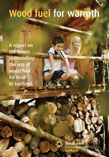We are the UK Government’s independent adviser on sustainable development. Through advocacy, advice and
appraisal, we help put sustainable development at the heart of Government policy
Publications
Wood Fuel for Warmth
| Date: | 27/06/2005 |
|---|---|
| Classification: | Energy, Climate Change |
| Document type: | SDC Reports & Papers |
| Download: | |
| Summary: |  Wood Fuel for Warmth, released in 2005 by SDC Scotland, examines the issues surrounding wood fuel for heat in Scotland. It demonstrates that wood-fuel heating could make a significant contribution to cutting carbon emissions – while providing much needed new rural jobs, and reducing fuel poverty. Wood Fuel for Warmth, released in 2005 by SDC Scotland, examines the issues surrounding wood fuel for heat in Scotland. It demonstrates that wood-fuel heating could make a significant contribution to cutting carbon emissions – while providing much needed new rural jobs, and reducing fuel poverty. The report finds that wood-fuel heating in households could cut emissions for heating and hot water by up to 96%. With a reasonable level of take-up, almost a quarter of CO2 emissions from Scotland’s domestic space and water heating could be cut." The report recommends that action needs to be taken to: • Formulate a clear and coherent renewable wood fuel heating strategy within a clear policy framework, which sets out targets for renewable heat uptake • Investigate a Renewable Heat Obligation • Investigate the concept of ‘clusters’ to introduce economies of scale into wood fuel supply, involving existing wood processors • Increase capital grants under the Scottish Community and Householder Renewables Initiative (SCHRI) • Clarify the definition and application of VAT to wood fuel heating appliances and fuels • Secure grant funding through the Community Energy Programme for community biomass schemes that local authorities can bid into • Establish directly supported domestic and large scale demonstration projects to build confidence. |
Tell a friend | Write a review | See all reviews >
